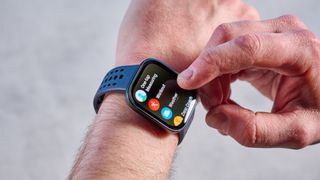Wellness
Explore Wellness
Latest about Wellness

5 reasons the new Wandrd PRVKE Zip just might be the best travel backpack ever
By Dan Bracaglia last updated
I’ve long been on the hunt for the ultimate travel backpack, and with the Wandrd PRVKE Zip, I think I've found it.

These are the best cheap fitness trackers in 2026
By Dan Bracaglia last updated
Keep tabs on your fitness, sleep, and overall wellness, all without breaking the bank. These are the best cheap fitness trackers in 2026.

According to my Apple Watch sleep score I'm only getting around 90 minutes of deep sleep a night — I asked two doctors if this is enough and their answers surprised me
By Ruth Jones published
Two sleep doctors explain what deep sleep is, how much we need and the real number you should be looking for on your Apple Watch sleep tracker.

Experts explain why over 65s need this amount of sleep — and how to get it
By Sarah Finley published
From memory consolidation to warding off dementia, this is how sleep can protect your mind and body as you age — and how to get enough of it at 65+

My iPhone Health app said my 'stability' was dropping — so I added these 5 moves to improve balance
By Jane McGuire last updated
I tried to fix my stability using these five moves.

Move over Peloton — I’ve been testing this exercise bike, and it’s over $1,000 cheaper than the Peloton Bike+
By Ashley Thieme published
Editor's ChoiceThe Echelon EX-5s Smart Connect Bike is a convenient at-home cardio solution and a cheaper Peloton alternative, but the membership price is a little off-putting.

Is it worth spending $5 on a Garmin watch face? I bought this one, and I have no regrets
By Nick Harris-Fry last updated
The Portal Hybrid watch face is one of the best third-party options I’ve come across in the Connect IQ store, and it looks great on my Garmin Forerunner 970.

The hamstring slider has worked wonders on my leg strength — here’s how to do it
By Nick Harris-Fry published
I’ve been doing a lot of work to strengthen my legs lately; the move that has made the biggest difference is the hamstring slider.

Experts explain why my simple morning habit is perfect for helping you sleep through the night — and may even improve life expectancy as a result
By Frances Daniels published
Getting enough sleep can add years to your life, so here's my quick morning hack to stop those 3 a.m. wake ups — and it's recommended by experts.

I just went hands-on with the Amazfit T-Rex 2 Ultra — and it beats the Apple Watch Ultra 3 in 5 big ways
By Dan Bracaglia published
The T-Rex 2 Ultra boasts massive battery life, a huge screen, and loads of features for outdoor enthusiasts... but can it compete with the Apple Watch Ultra 3?
Here at Tom’s Guide our expert editors are committed to bringing you the best news, reviews and guides to help you stay informed and ahead of the curve!
 Club Benefits
Club Benefits










